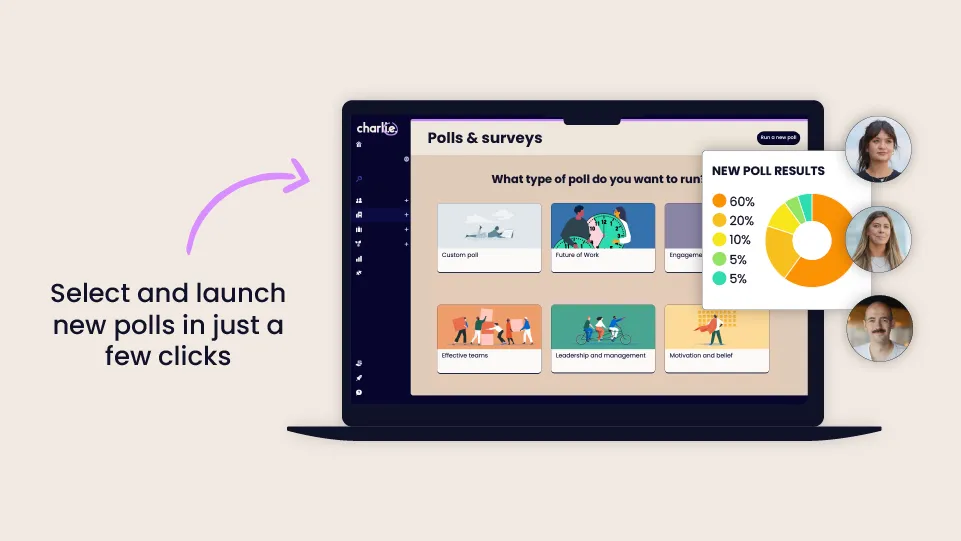Managing absences at your business: a complete guide

Managing employees’ absences can soon turn into a nerve-wracking task when you’ve never been responsible for it: who is off? Who is going to be off?
Small businesses and startups can struggle with understanding what the best way to go about it may be, but that doesn’t mean you should give up.
In this guide, I'll give you a tour of the kind of advice I give customers like you at Charlie, but also how we do it at our own business.
What types of absences do you have to manage on a regular basis?
The types of absences you can have in a business are very diverse. Here are the ones we allow for at CharlieHR:
- Holidays – paid time off for team members to relax and take some time away from work
- Sick leave – paid sick leave where we allow for more than the Statutory allowance
- Unpaid leave – in exceptional circumstances, and if a team member really needs to take time off, we’ll allow them to take unpaid leave
- Leave for parents – whether it's adoption, giving birth or fostering children, it's essential to have a parental leave policy for your employees
- Bereavement leave – when a team member loses someone dear, it's crucial that you have an absence policy in place
- Other types of leave such as long-term absences or TOIL for example
Why is it important to manage absences?
Absence management is crucial for two specific reasons:
- Making sure your business can still function despite absences – the more people are off, the less likely business gets done, so it's about finding a way to keep your activity going.
- Looking for ways to reduce employee absenteeism so it doesn’t become an issue – if you have too many people off, it's likely to have a massive impact on your growth and productivity results, so you should think about ways to mitigate this and support employees in an adequate manner.
- Making space for "life outside of work" – as an employer, it's important to take into account that work is just one part of your team member's life, and for that reason, you should have initiatives and absence policies that reflect that thinking.
7 essential ways to manage absences at your small business or startup
In my experience, the best way to avoid absenteeism is to create an environment where everyone naturally has your business' interest at heart. This sounds simple, but it is actually extremely difficult to achieve.
It’s a fragile balance to maintain, and it takes a lot of research and communication skills to be able to achieve it. That’s why having a clear method to manage time off is crucial for you. Let’s see what that looks like.
1. Create the right absence policies
HR policies might not look like the priority for your small business, but it’s vital you start to implement them in the early days, so that:
- You avoid friction between team members as the rules are the same for everyone
- You codify guidance into concrete policies to refer to when a problem arises
- Your team members will have no doubt about when they can or need to take time off
Creating HR policies for absences means you need to cover everything, from long-term sickness to mental health absences.
Absences policies can include a lot of different types of absence. You might miss some in the first instances, but that’s why creating policies is a work of observation: look for opportunities to iterate so the business can function properly.
2. Be flexible in your approach to working patterns
If team members have children, are carers, or are disabled, they can often deal with unexpected situations that cannot wait and therefore need to take time off.
What you need to remember is that flexibility will be key here to avoid any discrimination or inequality towards your employees.
A flexible approach to work will:
- help you create a more inclusive organisation
- significantly reduce the number of absences
For example, instead of getting parents to take a sick day to care for a sick child, put together a working from home policy for your team, to allow for that extra flexibility
And if they have to attend a GP appointment, allow for flexible hours so they can start work earlier or finish later to make up for the time they’re away.
At Charlie, for example, we prefer the term hybrid working to flexible working, but it works towards the same goals: reducing the number of absences, and making team members autonomous.
3. Spot patterns in absences to iterate your policies
To be able to manage employee absence and avoid unauthorised absences, you need to be able to spot issues and patterns straight away.
Let’s say for example that your company is closed for two weeks around Christmas and that you don’t allow for time off to be booked before or after – and despite this, many team members try and get this time booked off anyway.
Perhaps it’s time to revisit that policy and make sure it’s fair to everyone. Whatever policy you’re looking to change, it will all depend on the unique circumstances of your company.
In my opinion, the early days at startups and small businesses are essential to experiment, and once you grow, you might need to go back on these experiments and tweak your policies.
You shouldn’t be afraid to make these changes as this is the natural evolution of your company. However, rather than making a decision based on an assumption, I would always advise relying on data to make your decisions.
Not doing so could really lead to bad consequences and can make your team members unhappy. Perhaps it's time to run an engagement survey and understand what your team members want from your business.

4. Support your team members with the right initiatives
Iterating your policies is essential, but it's not enough. In my experience, absenteeism problems often arise when employers don't offer the right amount of support to their teams.
What does that mean in practice?
Again, it’s really dependent on what you’ve observed on the reports and what absences are a problem.
A few examples can be:
- If you notice some team members have more absences than others, don’t cut to the chase and put the blame on them. Talk to them and ask what might have been happening – you never know until you ask. Someone could be dealing with health issues or other life challenges that may impact their performance. Your role is to support them.
- If you see a team member struggling with their mental health, have a therapy service on hand that your team members can use as well as other wellbeing tools or better yet, create a stress leave policy so this does not happen in the first place.
- If you think a team member is not meeting deadlines, perhaps have a conversation with them about their workload. Is it manageable? The last thing you'd want is to send someone into burnout.
5. Manage expectations and deal with poor employee attendance
Supporting team members is, of course, one of the pillars of managing absences, but you might also have to address poor employee attendance if your absence rates are through the roof.
This is never a situation that we like being confronted with but it’s very important to tackle any serious absenteeism problems as soon as possible as they could seriously harm your business.
Here are a few tips from me when it comes to it:
- Depending on what your policy is, nudge people regarding absences such as sick days if there’s a limit to them – check out our guide on average numbers of sick days in the UK for more information
- Train managers to handle absences and keep open communication about what’s going on in their team member’s lives, so they can provide adequate support
- Always address situations directly as soon as they happen
- Hold informal conversations if you wish, but you can also choose to hold formal return-to-work conversations if you think that would have more of an impact on your team members
Again, this isn’t about punishing anyone but rather understanding what has led to the absences and perhaps working together to find solutions.
6.Give adequate support to parents and carers
Parents are likely to ask for more time off because of an unexpected event with their child: illness, school, etc.
Carers, on the other hand, often have to take the person they're taking care of to medical appointments.
In these moments, it's important that you remain understanding and give as much support as your team member needs.
In order to do this, it's essential you have a list of comprehensive policies for parents:
- A parental leave policy gives your team members the opportunity to book time off (unpaid) to take care of their children outside of the maternity and paternity leave.
- A shared parental leave policy is a way to give parents a fair amount of leave on both sides, especially if one of the parent doesn't have as much leave in their own company.
- A strong maternity leave policy and paternity leave policy will be important to distinguish yourself from others on the job market and will give time off for new parents in a way that you think is fair and nurturing.
And for carers (as well as others):
- A compassionate leave policy is a way to support team members with leave (paid or unpaid) when a close member of their family has become ill or if they've been in traumatic event such as a car crash.
- An emergency leave policy is the ability to give time off to team members because of unforeseen circumstances involving a dependant such as a child or family member.
7.Manage absences with a reporting tool
Managing absences cannot be done without analysing numbers, but these numbers can often be patchy when the process is not automated, leading to the inability to make decisions for your business.
To avoid that happening, it can be a good idea to invest in tools such an HR software system to:
- Record all your team's time off in one place
- Allow your team to self-serve
- Download reports and graphs to analyse the data and spots trends
With Charlie, this is something you can do easily – start a free trial today to find out more.



